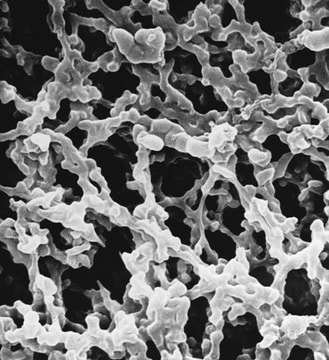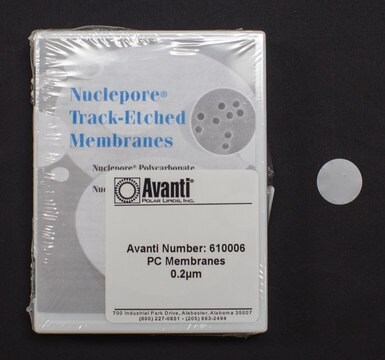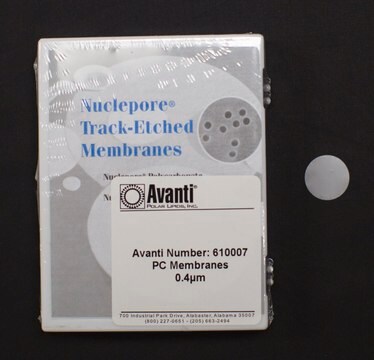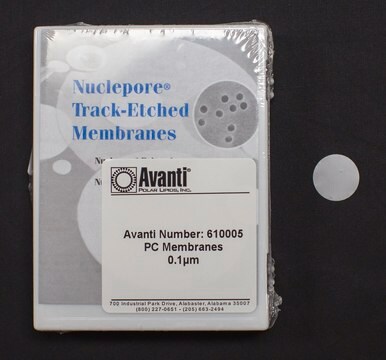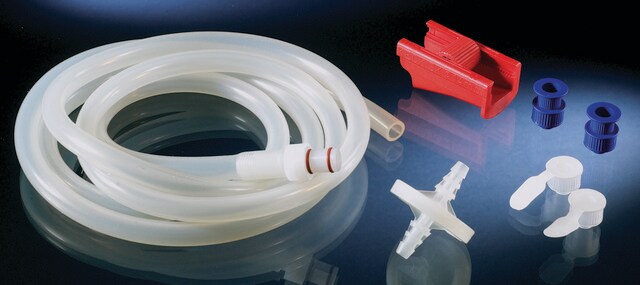WHA70914710
Whatman® polycarbonate Cyclopore® filter discs 1 μm pore size
translucent, hydrophobic, thin, 100 ea, 47 mm diam
別名:
70914710, filtration membranes, polycarbonate filters, polycarbonate membrane filters
ログイン組織・契約価格を表示する
すべての画像(2)
About This Item
UNSPSCコード:
40161507
NACRES:
NB.24
ポアサイズ:
1 μm pore size
物質:
PC membrane
直径:
47 mm
無菌性:
non-sterile
包装:
pack of 100 ea
おすすめの製品
製品名
Whatman® Cycloporeポリカーボナート膜およびポリエステル膜, cyclopore PC circles, pore size 1 μm, diam. 47 mm, pack of 100 ea
物質
PC membrane
無菌性
non-sterile
包装
pack of 100 ea
メーカー/製品名
Whatman (US reference)
Whatman 7091-4710
直径
47 mm
ポアサイズ
1 μm pore size
類似した製品をお探しですか? 訪問 製品比較ガイド
詳細
Whatman Cycloporeメンブランは、正確な細孔径の微多孔性メンブランで、特長としてシャープな分画、再現性の高い精密濾過などトラックエッチメンブランの性能特性を示します。膜が平らで滑らかなため、表面に粒子を確実に保持し、顕微鏡下で簡単に見ることができます。
Cycloporeメンブランは、Whatman独自所有の技術を用いて製造され、細孔径の分布を厳密にコントロールした精密なメンブランフィルターになっています。
メンブランは純粋なポリマーフィルムから製造され、化学的にきわめてクリーンです。混入物質を含まず、風袋重量が軽く、水分の吸収を最小限に抑え、非特異的なタンパク質結合はきわめて低レベルです。
ポリカーボネートメンブランは親水性で、直径と細孔径の様々な選択肢を取り揃えています。ポリエステルメンブランは、ほとんどの有機溶媒、アミド、ハロゲン化炭化水素に耐用性があります。幅広い化学薬品に対しこうした適合性があるため、多くの腐食性溶液の粒子検出に適しています。
特長と利点
代表的な用途
Cycloporeメンブランは、Whatman独自所有の技術を用いて製造され、細孔径の分布を厳密にコントロールした精密なメンブランフィルターになっています。
メンブランは純粋なポリマーフィルムから製造され、化学的にきわめてクリーンです。混入物質を含まず、風袋重量が軽く、水分の吸収を最小限に抑え、非特異的なタンパク質結合はきわめて低レベルです。
ポリカーボネートメンブランは親水性で、直径と細孔径の様々な選択肢を取り揃えています。ポリエステルメンブランは、ほとんどの有機溶媒、アミド、ハロゲン化炭化水素に耐用性があります。幅広い化学薬品に対しこうした適合性があるため、多くの腐食性溶液の粒子検出に適しています。
特長と利点
- 染色に対する親和性が低いため、光学的なコントラストがより明瞭になり、顕微鏡下での観察が容易
- 正確に表面に捕集されるため、サンプル検査が容易で、分析時間が短縮
- 全体が透明なメンブランを使用可能
- 濾液の吸収、吸着ともごくわずかで、吸湿性なし
- 低い風袋重量
- 粒子脱落がなく、きわめてクリーンな濾液
- 生物学的に不活性
代表的な用途
- 大気モニタリング - 微量元素(化学物質、放射性物質)、粒子の分析(塵埃、花粉、空気中の粒子)
- 分析方法 - 重量分析、デンシトメトリー、発光分光測定、蛍光X線、赤外線分析
- 水質分析 - 吸着性有機ハロゲン化合物(AOX)、微生物の直接計数、海洋生物の分析、溶存リン酸塩、硝酸塩、アンモニアの分析
- 血液濾過、細胞分析 - RBCの変形能、白血球の除去、RBCの濾過とプラスマフェレーシス、ケモタキシス、細胞診断、細胞培養
- 一般濾過 - 微粒子や細菌の除去、クロスフロー濾過、HPLCサンプル調製、溶液の濾過
- 顕微鏡 - 電子顕微鏡、落射蛍光顕微鏡、直接的な光学顕微鏡
- 微生物の分析 - 全微生物数の直接計数、回収、濃縮、分画、酵母、カビ、ジアルジア、レジオネラ、大腸菌、イヌミクロフィラリア
- 核酸の研究 - アルカリ溶出、DNA断片分画
- 海洋学の研究 - プランクトン調査の新しいツールとして機能。このきわめて薄い透明のメンブランは、強力ながら柔軟なため、プランクトンのサンプルを濾過後、このメンブランを顕微鏡のスライド上に直接マウント可能。(参考文献:Hewes et al. 1998; Graham and Mitchell 1999; Graham 1999.)
- バイオセンサー - 生物学的試薬の散布コントロールや電気化学的検出器のバリアとして
- 診断アッセイ - 流量コントロール、サンプル調製、血液分離、ラテックス微粒子の捕集
- 細胞生物学 - 細胞培養、ケモタキシス、細胞分析(直接染色、同位元素、蛍光ベースのアッセイ)。
- 経皮的な薬剤投与 - 治療薬保持のための不活性なマトリックスとして。
アプリケーション
Typical applications:
- Air monitoring - Trace elements (chemicals, radioactivity) and particulate analysis (dust, pollens, and airborne particles)
- Analytical methods - Gravimetric analysis, densitometry, emission spectroscopy, x-ray fluorescence, and infrared analysis
- Water analysis - Absorbable organic halides (AOX), direct count of microorganisms, marine biology and dissolved phosphates, nitrates, and ammonia analysis
- Blood filtration and cell analysis - RBC deformability, leukocyte removal, RBC filtration and plasmapheresis, chemotaxis, cytology, and cell culture
- General filtration - Particulate and bacteria removal, cross flow filtration, HPLC sample preparation, and solution filtration
- Microscopy - Electron microscopy, epifluorescence microscopy, and direct optical microscopy
- Microorganism analysis - Direct total microbial count, harvesting, concentration, fractionation, yeast, molds, Giardia, Legionella, coliform, and canine microfilaria
- Nucleic acid studies - Alkaline elution and DNA fragment fractionation
- Oceanographic studies - provide a new tool for studying planktonic organisms. These ultra thin transparent membranes are strong yet flexible, allowing for planktonic samples to be filtered and the membranes to be mounted directly onto microscope slides. (Ref: Hewes et al. 1998; Graham and Mitchell 1999; Graham 1999.)
- Biosensors - as a barrier offering controlled diffusion for biological reagents and electrochemical detectors
- Diagnostic assays - for flow control, sample preparation, blood separation, and capture of latex microparticles
- Cell biology - for cell culture, chemotaxis, and cytological analyses, e.g., direct staining, isotopic and fluorescence based assays
- Transdermal drug delivery - as an inert matrix for retention of therapeutics
特徴および利点
Features and Benefits:
- Low affinity for stains providing higher optical contrast and making visibility under a microscope easy
- True surface capture provides easy examination of samples and short analysis times
- Totally transparent membranes available
- Negligible absorption and adsorption of filtrate; nonhygroscopic
- Low tare weights
- No particle shedding provides ultra clean filtrate
- Biologically inert
法的情報
Cyclopore is a registered trademark of Whatman International Ltd.
Whatman is a registered trademark of Cytiva
最新バージョンのいずれかを選択してください:
ライフサイエンス、有機合成、材料科学、クロマトグラフィー、分析など、あらゆる分野の研究に経験のあるメンバーがおります。.
製品に関するお問い合わせはこちら(テクニカルサービス)
